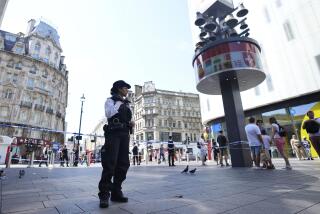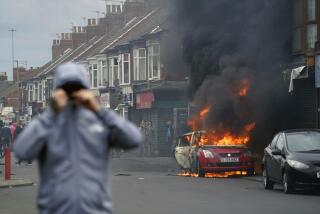Officer Dies in London Riot, 58 Police Injured : 400 Youths, Black and White, Involved as Urban Violence Spreads to Tottenham District
- Share via
LONDON — A policeman was fatally slashed with a machete and 58 other officers were wounded Sunday in ferocious street battles with hundreds of rampaging youths in the racially mixed Tottenham section of north London.
In all, at least 80 people were injured in what was the most savage outbreak of the urban violence that has plagued Britain during the last month. Some of the officers were wounded by shotgun blasts, and it was believed to be the first time that firearms were used by rioters in Britain.
Scotland Yard said that only four of the rioters were arrested. The low number of arrests reflected the lack of police control in the area.
A police spokesman early today described conditions in the area as a “standoff.”
“They are in the estate (housing development) and we are outside,” the spokesman said.
Heavy police reinforcements armed with tear gas were dispatched to the Tottenham area in an attempt to restore order.
Public Housing
Police said that between 400 and 500 mainly young people were involved in the rioting, which was centered in a public housing project. They added that both white and blacks were taking part.
Looting and arson were also reported as rioters broke into schools and shops, overturned cars and set them on fire. One house was reported set ablaze. Elderly residents of neighboring streets were evacuated.
By early today, only sporadic incidents were reported. Police patrolled many of the streets surrounding the housing development, which were littered with debris and burned-out cars from the night of violence.
During the fighting, an officer dragging away an injured colleague said, “They’re using shotguns now.”
The caretaker of the housing project said: “Every time the police charge the mob, they are being pelted with firebombs and paving slabs. Things are being thrown by people on the balconies. The atmosphere is explosive.”
The cause of the violence was apparently similar to that which triggered two nights of rioting last weekend in the mainly black south London district of Brixton--a police raid on a black family’s home that went tragically wrong.
More than 50 people were injured and 150 were arrested in a frenzy of looting, arson and assaults in Brixton when police accidentally shot and wounded a black mother of six as they burst into her home in search of one of her sons, wanted in connection with a shooting incident.
A police spokesman said that Sunday’s violence started when 49-year-old Cynthia Jarrett collapsed and died when police entered her home in search of stolen goods after her son, Floyd, was arrested in an investigation involving a stolen car.
Ironically, a police tactic of concentrating efforts on single dwellings was being used because broader searches involving many homes have heightened emotions in racially-mixed neighborhoods.
Police said the Jarrett woman was cooperative “but towards the end of the search, another of her sons arrived home and began strongly objecting to the police presence.”
“She collapsed and the officers were physically shoved out of the house,” a police statement said. Police finally persuaded the family to allow the officers to return to the home “and one of the officers trained in first aid administered mouth-to-mouth resuscitation, but without success,” the statement said.
The victim’s daughter, Cynthia, 23, said a policemen pushed her mother and caused her to fall. “My mother weighed 20-odd stone (280 pounds) and she lost her balance, stumbled and fell to the floor. She was gasping for breath,” the daughter said.
The family called an ambulance, but less than 15 minutes later she was dead.
As word of the woman’s death spread through the neighborhood Sunday, tension rose sharply. And violence erupted after relatives and friends protested during the afternoon outside the local police station.
Initially, it appeared that police had snuffed out the unrest as they quickly hemmed in a group of youths who had pelted them with rocks and bottles.
But then other groups gathered, throwing Molotov cocktails and bricks at officers as they tried to disperse the angry crowd. Then at least one shotgun blast was fired, wounding two police officers and a news agency reporter.
“We have no control over anybody else in this community,” the dead woman’s daughter told a reporter from a British domestic news agency. “People want to express themselves. There is a lot of anger over what has happened. It would be impossible for me to appeal to the people for calm.”
The area’s local government chairman, Bernie Grant, who is black, condemned the police search and demanded a public investigation of the incident that triggered the riot.
“The local (police) chiefs must resign immediately if any faith is to be restored in the police,” he said.
The police officer who died was reported attacked with a machete as he attempted to protect firemen fighting to contain flames from a supermarket looted and set ablaze by the mob.
“We were trying to get above the supermarket to rescue people living on the floors above it,” a fireman said. “All of a sudden 200 or 300 black youths ran up hurling bricks, bottles, stones and petrol (gasoline) bombs.”
The dying officer was found after the attackers retreated, the fireman said.
Sunday’s violence was the third major incident of urban unrest to hit racially mixed areas of Britain’s inner cities in less than a month.
The intensity of the violence and the fact that Tottenham has no history of racial unrest--as do Brixton and other areas that have erupted recently--are bound to boost pressure on the government of Prime Minister Margaret Thatcher for new actions to ease inner-city tensions.
Senior government officials have rejected charges made by political opponents that the unrest is linked to the country’s record 13% unemployment. The jobless rate in racially mixed areas is far higher.
After the previous riots, senior Thatcher government officials described them as isolated incidents.
More to Read
Sign up for Essential California
The most important California stories and recommendations in your inbox every morning.
You may occasionally receive promotional content from the Los Angeles Times.













